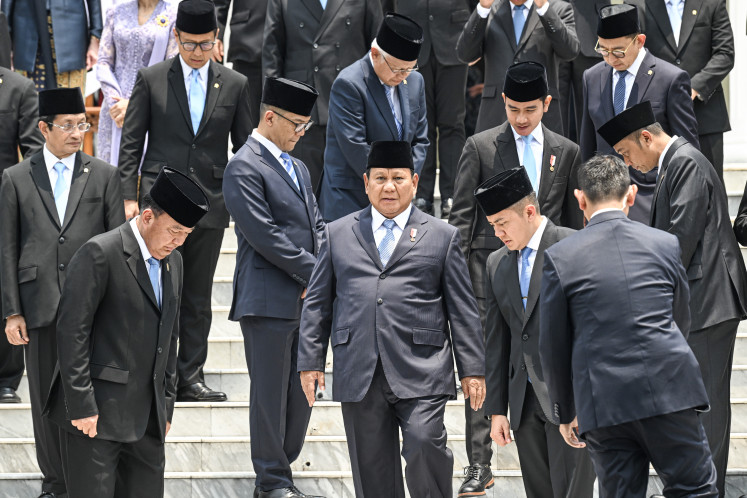Popular Reads
Top Results
Can't find what you're looking for?
View all search resultsPopular Reads
Top Results
Can't find what you're looking for?
View all search resultsMinistry to halt village funds disbursement over irregularities
The Finance Ministry will temporarily stop the disbursement of village funds to some villages in Konawe regency, Southeast Sulawesi, in response to irregularities found in the application for and use of the funds
Change text size
Gift Premium Articles
to Anyone
T
he Finance Ministry will temporarily stop the disbursement of village funds to some villages in Konawe regency, Southeast Sulawesi, in response to irregularities found in the application for and use of the funds.
The ministry has promised to resume payouts once the Home Ministry has sorted out the irregularities and ascertained compliance with Law No. 6/2014 on villages.
The village funds, a signature policy of President Joko “Jokowi” Widodo to spread economic development to more than 75,000 villages in the country, have become one of the main funding sources of village administrations, a Home Ministry official has said.
The Finance Ministry's financial balance director general, Astera Primanto Bhakti, said the ministry would halt the disbursement of the village funds to some villages pending the Home Ministry’s investigation into the matter.
“We will resume the disbursement once there is clarification on the villages’ status,” Astera said in a discussion in Jakarta on Tuesday.
The central government had disbursed Rp 52 trillion (US$3.68 billion) to villages as of November, around 74 percent of the Rp 70 trillion earmarked for the village funds in this year’s state budget, Astera added.
The transfer of village funds is in the spotlight since Finance Minister Sri Mulyani Indrawati disclosed that many villages were established just to receive such funds, despite having no population.
Speaking at the same event, the Home Ministry's director of financing facilities and village assets, Benny Irwan, said the village fund transfers — one of seven sources of income for villages — were highly anticipated by the village administrations considering their sizable amount compared to the villages’ other sources of income.
“The village funds are always [eagerly] awaited by the villagers because of their significant portion. In general, they account for up to 80 percent of [a village’s] income,” said Benny, adding that the villages could receive revenue sharing funds (DBH) from local tax as well as regencies and cities budgets, among other sources.
The Home Ministry recently investigated 56 villages in Konawe regency for allegedly violating procedures and requirements in the application for and use of funds.
Of the 56 villages, 34 satisfied the requirements set by the 2014 Village Law, while another 18 were found to have not complied with procedures.
Meanwhile, in four villages, additional checks are needed as the ministry found inconsistencies between the villages’ population and area.
Benny said the Home Ministry aimed to complete its investigation into the villages in Konawe by the end of this year.
He said there were no fictitious villages, saying a grandfather clause in the 2011 Village Law meant that the government had acknowledged the existing villages before the regulation was enforced, although some villages could have violated the requirements set out in the regulation.
“There is no such thing as fictitious villages. There are only villages that have yet to have arrange their administration in accordance to the Village Law,” said Benny.
He added the central government had encouraged regional administrations to verify villages in their respective areas to assess their adherence to the Village Law.
Regional Autonomy Watch (KPPOD) executive director Robert Endi Jaweng urged the government to make a single database containing all villages in the country to avoid maladministration.
“The [village] database is important. We currently have no integrated village database that can be used as the basis for policy,” said Robert.
The central government would also need to strengthen accountability on the use of village funds at the local level,
Robert said, adding that such a measure would need support from the government so that the village administrations could manage the usage of the funds.










